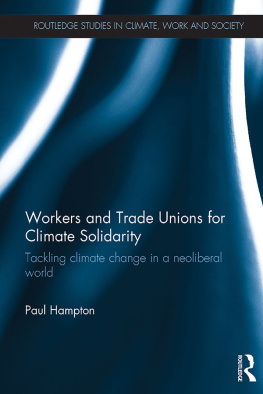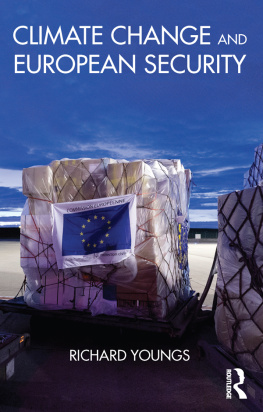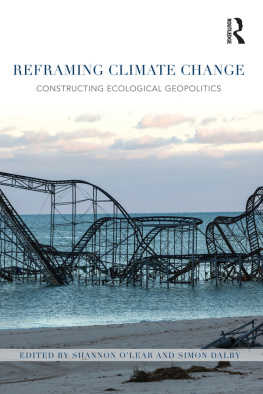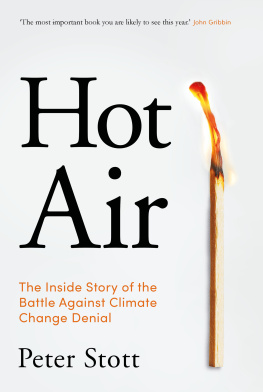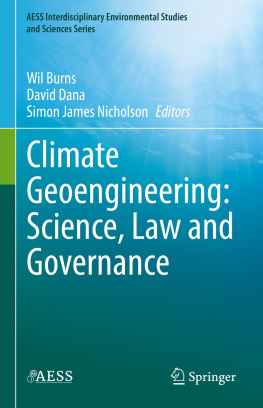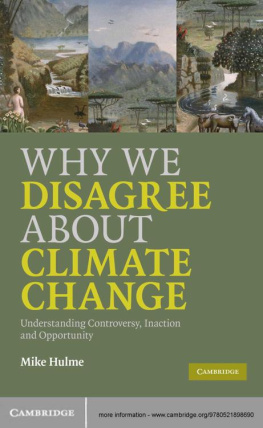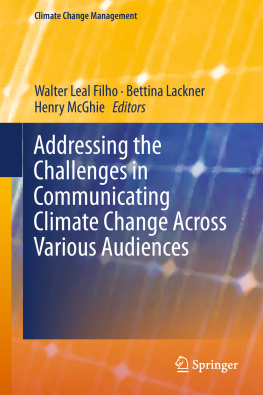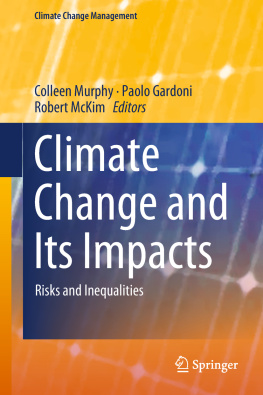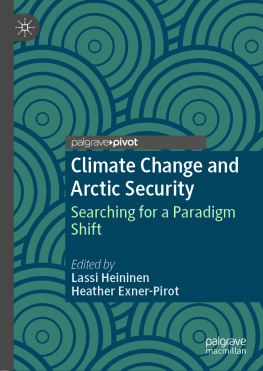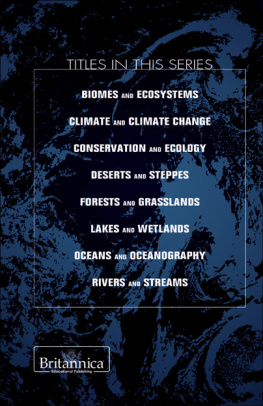This is a provocative book in the best sense of the word. The exploitation of nature and the exploitation of labour are two sides of the same capitalist dynamic; effective resistance to both requires a common struggle in which green activists and trade unionists combine as equal partners.
Richard Hyman, London School of Economics and Political Science, UK
Environmental Labour studies is a young and burgeoning research field. This book is a landmark publication offering the first theoretically and empirically brilliant analysis of trade unions actions for climate change in the UK, suggesting that the workers movement can become an environmental innovator in the struggle for climate justice.
Nora Rthzel, Ume University, Sweden
Paul Hamptons analysis is built on a thorough review of mainstream and radical literature on the politics of climate change, together with an in depth narrative of worker and trade union attempts to grapple with climate change and the various forms of green capitalism thinking in the UK context.
Paul Burkett, Indiana State University, USA
Who has the interest and power to confront the apocalyptic dangers of global warming, and the vested interests blocking mitigation? This book tackles the largely ignored question of agency. Theoretically sophisticated and empirically thorough, it explores the potential of the working class and its organisations to lead an effective response.
Constance Lever-Tracy, University of South Australia, Australia
Paul Hampton has assembled a wealth of evidence to demonstrate that trade unions are not only becoming increasingly important participants in climate change debates, but important actors in contributing to a more sustainable planet. This book deserves to be read by all those who profess to be interested not only in climate change and the environment, but also labour studies.
David Uzzell, University of Surrey, UK
A ground-breaking book on the most timely of topics: how workers and their trade unions are organising in order to fuse struggles for social justice and against climate change. Highly recommended to anyone interested in environmental politics, industrial relations, social movements and sustainable development.
Romain Felli, University of Geneva and Swiss National Science Foundation, Switzerland
At last a book arguing that presents convincing evidence of climate-conscious trade unionism, whether through environmental representatives or bargaining for a just transition, inspiring us all to become strategic climate actors.
Linda Clarke, University of Westminster, UK
Workers and Trade Unions for Climate Solidarity
This book is a theoretically rich and empirically grounded account of UK trade union engagement with climate change over the last three decades. It offers a rigorous critique of the mainstream neoliberal and ecological modernisation approaches, extending the concepts of Marxist social and employment relations theory to the climate realm. The book applies insights from employment relations to the political economy of climate change, developing a model for understanding trade union behaviour over climate matters. The strong interdisciplinary approach draws together lessons from both physical and social science, providing an original empirical investigation into the climate politics of the UK trade union movement from high-level officials down to workplace climate representatives, from issues of climate jobs to workers climate action.
Workers and Trade Unions for Climate Solidarity will be of great interest to students and researchers in environmental politics, climate change and environmental sociology.
Paul Hampton received his PhD in climate change and employment relations from London Metropolitan University. He is head of research and policy at the Fire Brigades Union in the UK.
Routledge Studies in Climate, Work and Society
In The Routledge Studies in Climate, Work and Society series, scholars and other thinkers at the forefront of constructing a strategic link between work and climate change contribute to identifying the issues, evaluating policies and silences, tracking change, and stimulating international exchange of ideas and experience. Collectively, the books in this series will emphasise fresh thinking, strategic creativity, international and inter-sectoral comparisons and contribute to the further development of the role of work in societal responses to global warming.
Series Editor: Dr. Carla Lipsig-Mumm, Professor of Work and Labour Studies, York University, Canada.
Editorial Board:
Professor Elaine Bernard, Executive Director, Labor and Worklife Program Harvard Law School, Harvard University, US
Professor Emeritus Richard Hyman, Industrial Relations, London School of Economics and Political Science UK
Dr. Kenneth Odero, Climate XL-Africa, Kenya
Workers and Trade Unions for Climate Solidarity
Tackling climate change in a neoliberal world
Paul Hampton
Workers and Trade Unions for Climate Solidarity
Tackling climate change in a neoliberal world
Paul Hampton

First published 2015
by Routledge
2 Park Square, Milton Park, Abingdon, Oxon OX14 4RN
and by Routledge
711 Third Avenue, New York, NY 10017
Routledge is an imprint of the Taylor & Francis Group, an informa business
2015 Paul Hampton
The right of Paul Hampton to be identified as author of this work has been asserted by him in accordance with sections 77 and 78 of the Copyright, Designs and Patents Act 1988.
All rights reserved. No part of this book may be reprinted or reproduced or utilised in any form or by any electronic, mechanical, or other means, now known or hereafter invented, including photocopying and recording, or in any information storage or retrieval system, without permission in writing from the publishers.
Trademark notice: Product or corporate names may be trademarks or registered trademarks, and are used only for identification and explanation without intent to infringe.
British Library Cataloguing-in-Publication Data
A catalogue record for this book is available from the British Library
Library of Congress Cataloging-in-Publication Data
Hampton, Paul Stephen.
Workers and trade unions for climate solidarity : tackling climate change in a neoliberal world / Paul Hampton.pages cm
1. Climatic changes--Political aspects--Great Britain.
2. Climatic changes--Economic aspects--Great Britain. 3. Environmental policy--Great Britain. 4. Labor unions--Political activity--Great Britain. I. Title.
QC903.2.G7H36 2015
363.738740941--dc23
2014047322
ISBN: 978-1-138-84142-0 (hbk)
ISBN: 978-1-315-73222-0 (ebk)
For Elliott, whose future depends on solidarity
Contents
If the questions of employment and human resources are not more closely integrated into climate policies, we may expect them to become a major barrier to the transformations demanded.
Sylvie Dupressoir et al. 2007
While there has been considerable research on the role of employers as climate actors, the actual and potential role for workers has been largely overlooked. Yet workers, organised in trade unions generally represent the largest voluntary organisations within states and historically have been great forces for progress. Unions offer a potential pole around which a revived climate movement might coalesce.
Paul Hampton 2015
Climate change has already shaken up the nature of work and the distribution of employment within and between countries, regions and communities. It is changing how we work, what we produce, and where we can produce it. It disrupts the lives of workers and the global supply chains of transnational corporations, undermines governments and creates a new class of precarityclimate migrants. But at the same time as global warming destroys livelihoods and communities, it is forcing the emergence of new alliances: between labour and youth movements, labour and environmental groups, labour and professional associations, and in some countries, labour and first nations. These new labour-environmental alliances, although volatile, are revitalizing the much abused idea of a just transition for labour. Originally a visionary statement of labours autonomy in crafting its struggle to slow global warming, over the past 15 years just transition has shrunk to mean no more than fair remuneration for job loss because of climate change, and adaptive training for greener jobs.
Next page
